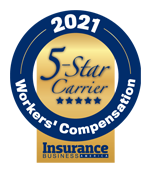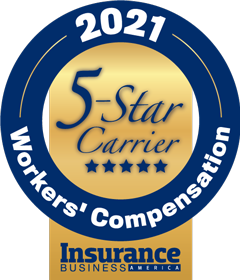
Best Workers’ compensation carriers in the hospitality, manufacturing and tech industries
Five-Star Excellence Awards in Worker’s Compensation
The construction industry is a major consumer of workers’ compensation insurance, but often the devil is in the detail as there are many specialized niches each with their own subtle nuances. Each niche or type will then have its own market appetite – depending on location and the exact nature of the covered.
Although COVID hit a number of industries hard, construction hasn’t been one of them. “Construction never really stopped, especially in the southern states,” Kevin Clary vice president of risk management at Amerisure told IBA. “We’re in Michigan and we were probably one of the more stringent locked down states – and even here, construction stayed essential.”
Total net written premiums in 2019 reached $48.6 billion, with $43.2 billion of that total being written by private carriers.
Unlike construction, the hospitality industry has been hard hit by the COVID-19 pandemic, and so too has its workers compensation market.
“No one wants to be on the hook for claims,” one broker told us. “There are still a few carriers either limiting or blocking access for writing these policies, though most are renewing what is on their books,“ the broker said. “In general, these tend to be loss forward accounts so you either have really good ones or really bad ones.”
When COVID recedes, and business picks up again for your clients, it’s all the more important that you choose providers who provide them with great service – and these are the insurance providers that our research showed us were the top of their game.
Manufacturers account for more than 11% of the country’s output, employing 8.5% of the US total workforce – so it is a substantial market to provide insurance for. And it seems to be a market that carriers have a good appetite for.
“Most carriers really like this industry and will go to bat for it, but it’s heavily dependent on the whole account.” One broker told our researchers. “These accounts tend not to switch agents or carriers often, so while it’s desirable, unless you specialize in it, you’re probably not seeing a lot of it.”
So, if clients don’t switch often, there’s all the more reason to consider these researched 5-Star-rated insurance providers
Tech is booming and as this new breed of company takes over the Dow Jones, so insurance carriers are fighting to win business in the tech industry. More specifically, carriers are fighting to write the workers compensation, which is broadening their appetite ‘because they want as much of this on the books as possible,’ one broker told IBA.
Workers compensation for tech companies is ‘probably one of the easiest lines of business to place right now,’ the broker added.
There are multiple reasons for this.
One is that workers’ compensation, in general, is desirable, especially for office classifications. Another is that there ‘aren’t a ton of tech-specific codes,’ meaning that, in many cases, they are classifying people in clerical roles – one of the cheaper class codes.
‘Duties are simply sitting at a computer – our best-case scenario,’ the broker said.
5-Star Excellence Awards
Workers’ Compensation for Construction
- Accident Fund
- AIG
- Applied Underwriters
- Chubb
- CNA
- Everest Insurance
- Key Risk - a Berkley Company
- Liberty Mutual Insurance
- Method Insurance Services
- Midwestern Insurance
- Alliance
- Nationwide
- The Hartford
- Travelers
- Zenith Insurance
Workers’ Compensation For Hospitality
- Accident Fund
- AIG
- Applied Underwriters
- Chubb
- Hanover
- Key Risk - a Berkley Company
- Liberty Mutual Insurance
- Method Insurance Services
- The Hartford
- Travelers
- Zenith Insurance
Workers’ Compensation for Manufacturing
- AIG
- Applied Underwriters
- Chubb
- Hanover
- Key Risk - a Berkley Company
- Liberty Mutual Insurance
- Method Insurance Services
- The Hartford
- Travelers
- Zenith Insurance
- Zurich Insurance Group
Workers’ Compensation for Technology companies
- AIG
- Applied Underwriters
- Chubb
- Everest Insurance
- Hanover
- Key Risk - a Berkley Company
- Liberty Mutual Insurance
- Method Insurance Services
- The Hartford
- Travelers
- Zenith Insurance
- Zurich Insurance Group
Which one is the most common injury in the hospitality industry?
The hospitality industry includes a wide range of jobs and tasks as varied as food preparation, cooking, bed making cleaning, food and beverage service, operating office equipment or working as a tour guide. Most injuries within the hospitality industry are preventable through training and supervision. The major workplace risks within this industry are manual handling; slips, trips, and falls; machinery and
equipment; electricity; hazardous substances and dangerous goods; heat stress; burns and cuts; and cash handling and opening and closing procedures.
What is workers’ compensation for owners?
In nearly every state, business owners can exempt themselves from workers’ compensation insurance coverage; even in these states, however, there are exceptions, usually to businesses that contract with other businesses or to the self-employed.
In every state – except for Texas – any businesses with one or more employees must have workers’ comp. Self-employed business owners must have a policy prior to hiring their first non-owner employee. In most states in the U.S., a business’s owner (or owners) are able to opt out of covering themselves under their own workers’ compensation plan. Depending on whether or not the business is a sole proprietor, partnership, limited liability company (LLC) or corporation, the rules governing owner coverage can vary.
But exceptions do exist, even if state rules allow some business owners to forgo workers’ compensation coverage for him/herself. A lot of businesses that hire outside contractors must obtain workers’ comp coverage for those contractors.
Does workers’ compensation come out of paycheck?
Companies pay for workers’ compensation insurance, no matter which state the company is based in. An employee’s cost for workers’ comp is a percentage of his or her payroll. There are, however, worker payroll deductions for workers’ comp insurance, unlike health insurance. In some states, companies are required to pay for workers’ comp through a monopolistic state agency.
How long does it take for workers’ comp to offer a settlement?
Typically, the amount of time it takes to receive a workers’ compensation settlement is roughly 30 to 60 days from the time an employee reaches an agreement to when the insurance companies pays out, assuming the state board approves the settlement.
Several factors, however, affect the time line: the amount of time it takes to prepare the settlement paperwork; the time spent agreeing on any changes in the paperwork’s language; the length of time it takes for the State Board of Workers’ Compensation to undergo the paperwork review. Finally, the insurance company has 20 days from the date the settlement is approved to pay the worker the settlement money. Insurance companies owe a 20% late penalty if they do not pay it within the 20 days allotted.
How do I choose workers’ compensation insurance?
For tech start-ups and small businesses, work-related injuries and illnesses can be devastating. These incidents can lower morale, productivity, and increase insurance premiums. These are 5 tips to get the best coverage:
Find a good broker. A good broker can educate employers on the best policies to protect their companies, particularly brokers who are expert agents as well as knowledgeable about the tech industry. A skilled broker will understand the workers’ compensation requirements in the business’s state and how they apply.
Know the state’s requirements. Because workers’ compensation requirements vary by state, employers should ensure his or her broker is knowledgeable in the laws that apply to their business in each locale. Different states have different mandates that the workers’ compensation coverage that an employer must purchase and the benefits available.
Create a safety plan. Safety plans and firm policies – such as ladder safety, clear signage, routine training, and protective gear – can mitigate the risk of work-related injuries. In some states, credits or premium discounts are offered for workplace safety programs.
Understand what workers’ comp covers. Workers’ comp covers accidental bodily injury while on the job and bodily injury by disease cause or aggravated by the work conditions. Workers’ comp benefits do not, however, apply where injuries result from criminal activity, illicit drug use, suicide, or self-inflicted wounds.
Review the policy routinely. Employers should review their insurance policies annually with their broker, to ensure there have been no changes to business operations that could impact the coverage or premium.
Keep up with the latest news and events
Join our mailing list, it’s free!




